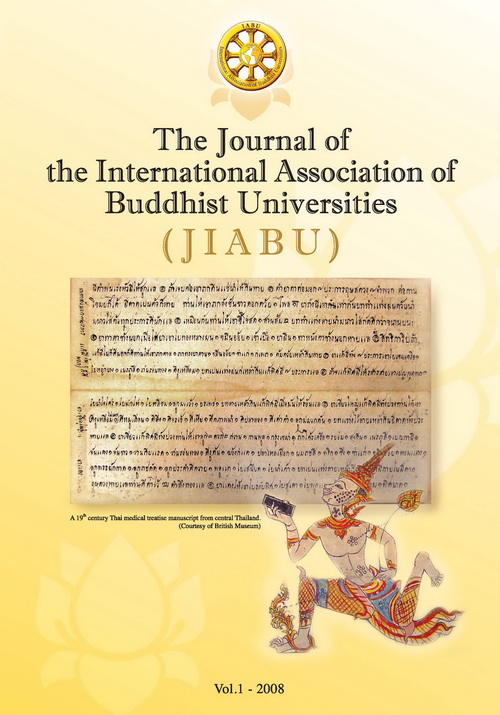Privacy, the Individual and Bioinformatics: 71 A Buddhist Perspective
Main Article Content
Abstract
Bioinformatics is a new field of study in which the power of
computer technology is harnessed to process biological information;
thus the field is an interesting one where the two major technological
trends of the early twenty-first century, namely biotechnology and
information technology, are fused together. The application of
computers and information technology in biological science has been
necessary because biological information is exploding at an
exponential rate, and there are many applications that the utilization
of computer technology could lead to breakthroughs. One clear area
of the application is of course the use of computers to sequence
the human genome, which would not have been even conceivable if
not for the use of a large amount of raw computing power to crunch
through all the information that is available. Moreover, as of now
Article Details
Views and opinions expressed in the articles published by The Journal of the International Association of Buddhist Universities (JIABU), are of responsibility by such authors but not the editors and do not necessarily reflect those of the editors.
References
between Bioethics and Computer Ethics.” Asian
Biotechnology and Development Review, 9.1: 37-44.
Palsson, G. & Rabinow, P., 2001, “The Icelandic Genome Debate”,
Trends in Biotechnol, 19.5: 166-171, p. 167.
Ess, C., 2005, “Lost in translation? Intercultural dialogues on
privacy and information ethics”, Ethics and Information
Technology, 7, 1, 1-6.
Capurro, R., 2005, “Privacy. An Intercultural Perspective”,
Ethics and Inf. Technol, 7, 1, 37-47.
Moor, J., 2002, “Toward a Theory of Privacy in the Information
Age”, in Baird, R. M., Ramsower, R. & Rosenbaum, S.
E., eds., Cyberethics: Social & Moral Issues in
the Computer Age, Amherst, New York, Prometheus
Books, 200-212.
Moore, A. D., 2003, “Privacy: Its Meaning and Value”,
American Philosophical Quarterly, 40(3): 215-227.
Kitiyadisai, K., 2005, “Privacy Rights and Protection:
Foreign Values in Modern Thai Context”,
Ethics Inf Technol, 7: 17-26.
Dougherty, S., 2004, “On Genetic Programs and Feedback
Networks”, Configurations, 12: 263–285.
Thacker, E., 2003, “Bioinformatics and Bio-Logics” Postmodern
Culture, 13.2.
Hongladarom, S., 2005, “Electronic Surveillance in the Workplace:
A Buddhist Perspective”, Electronic Monitoring in
Weckert, J. ed., the Workplace: Controversies and
Solutions, Hershey, PA: Idea Group: 208 - 225.
Santideva., 1997, A Guide to the Bodhisattva Way of Life,
Vesna A. Wallace and B. Alan Wallace., trans., Ithaca,
New York, Snow Lion, V: 62-63.
Nagarjuna., 1995, The Fundamental Wisdom of the Middle Way:
Nagarjuna’s Mulamadhyamakakrika, Garfield, J.,
trans., New York, Oxford University Press, 18: 1.
Klitzman, R., 2006, “Complications of Culture in Obtaining
Informed Consent” Am J Bioeth, 6.1: 2-21.
Macpherson. C. C., 1999, “Research Ethics Committees:
A Regional Approach”, Theor Med Bioeth, 20: 161-179.
London, L., 2002, “Ethical Oversight of Public Health Research:
Can Rules and IRBs Make a Difference in Developing
Countries”, Am J Public Health, 92.7: 1079-1084.
Turner, Leigh., 2005, “From the Local to the Global: Bioethics
and the Concept of Culture”, J Med Philos, 30.3: 305-320.
Walter, P., “The Doctrine of Informed Consent: A Tale of Two
Cultures and Two Legal Traditions.” Issues Law Med 1999;
14.4: 357-375.


